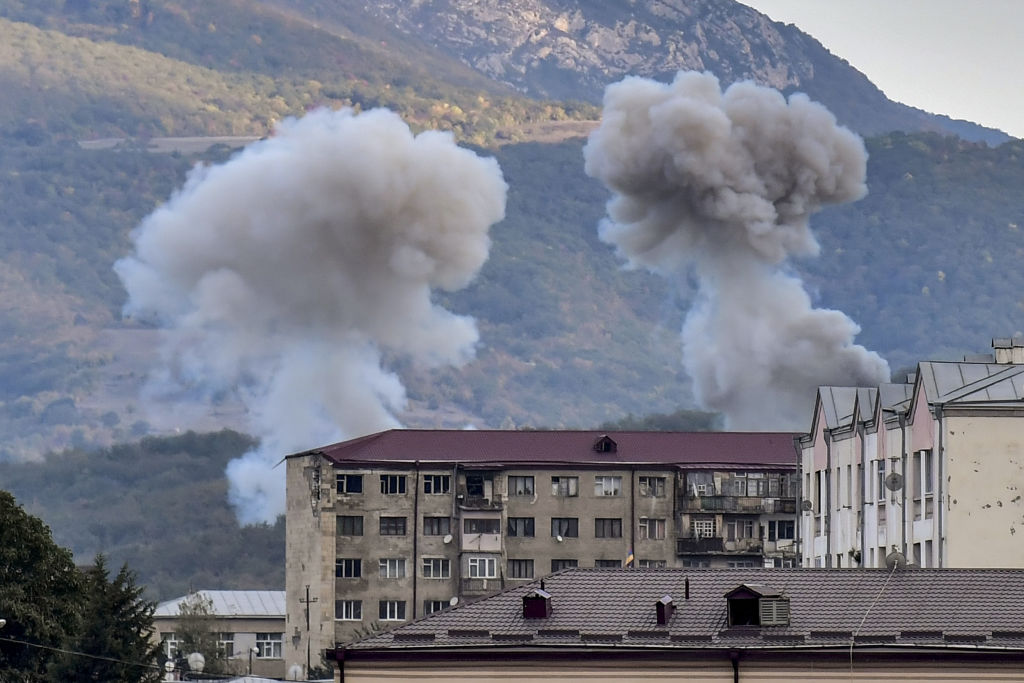Why Azerbaijan may not want a long-term ceasefire with Armenia in disputed region


A free daily email with the biggest news stories of the day – and the best features from TheWeek.com
You are now subscribed
Your newsletter sign-up was successful
Armenia and Azerbaijan have agreed to a temporary ceasefire, which went into effect Saturday after nearly two weeks of violent conflict in the disputed Nagorno-Karabakh region so the two sides could exchange prisoners and recover bodies. Both countries quickly accused the other of breaking it, although the main cities that have experienced shelling so far — Shushi and Stepanerkt — have reportedly experienced a respite from the violence.
The agreement was reached after 10 hours of negotiations in Moscow. Russian Foreign Minister Sergei Lavrov said Yerevan and Baku would now begin "substantive talks," but not everyone is optimistic, since both sides appear to be rigid in their demands.
Armenian Foreign Minister Zohrab Mnatsakanyan said Armenia wants Nagorno-Karabakh — officially recognized as part of Azerbaijan, but mostly governed by ethnic Armenians — to be an independent state, while Azeri Foreign Minister Jeyhun Bayramov said not enough pressure was placed on Armenia during the discussions, adding that Azerbaijan, which is backed by Turkey, expects to take control of more territory and the ceasefire will only last as long as it takes for the Red Cross to arrange for bodies to be exchanged.
The Week
Escape your echo chamber. Get the facts behind the news, plus analysis from multiple perspectives.

Sign up for The Week's Free Newsletters
From our morning news briefing to a weekly Good News Newsletter, get the best of The Week delivered directly to your inbox.
From our morning news briefing to a weekly Good News Newsletter, get the best of The Week delivered directly to your inbox.
Per Al Jazeera, there is a sense among the Azeris that, after 30 years, "this is the first time they have the upper hand" thanks to increased military power and "sophisticated weapons," and, therefore, a long-term ceasefire reportedly may not be widely desired. Read more at BBC and Al Jazeera.
A free daily email with the biggest news stories of the day – and the best features from TheWeek.com
Tim is a staff writer at The Week and has contributed to Bedford and Bowery and The New York Transatlantic. He is a graduate of Occidental College and NYU's journalism school. Tim enjoys writing about baseball, Europe, and extinct megafauna. He lives in New York City.
-
 The ‘ravenous’ demand for Cornish minerals
The ‘ravenous’ demand for Cornish mineralsUnder the Radar Growing need for critical minerals to power tech has intensified ‘appetite’ for lithium, which could be a ‘huge boon’ for local economy
-
 Why are election experts taking Trump’s midterm threats seriously?
Why are election experts taking Trump’s midterm threats seriously?IN THE SPOTLIGHT As the president muses about polling place deployments and a centralized electoral system aimed at one-party control, lawmakers are taking this administration at its word
-
 ‘Restaurateurs have become millionaires’
‘Restaurateurs have become millionaires’Instant Opinion Opinion, comment and editorials of the day
-
 Ex-South Korean leader gets life sentence for insurrection
Ex-South Korean leader gets life sentence for insurrectionSpeed Read South Korean President Yoon Suk Yeol was sentenced to life in prison over his declaration of martial law in 2024
-
 Rubio boosts Orbán ahead of Hungary election
Rubio boosts Orbán ahead of Hungary electionSpeed Read Far-right nationalist Prime Minister Viktor Orbán is facing a tough re-election fight after many years in power
-
 Key Bangladesh election returns old guard to power
Key Bangladesh election returns old guard to powerSpeed Read The Bangladesh Nationalist Party claimed a decisive victory
-
 Epstein files topple law CEO, roil UK government
Epstein files topple law CEO, roil UK governmentSpeed Read Peter Mandelson, Britain’s former ambassador to the US, is caught up in the scandal
-
 Iran and US prepare to meet after skirmishes
Iran and US prepare to meet after skirmishesSpeed Read The incident comes amid heightened tensions in the Middle East
-
 EU and India clinch trade pact amid US tariff war
EU and India clinch trade pact amid US tariff warSpeed Read The agreement will slash tariffs on most goods over the next decade
-
 Israel retrieves final hostage’s body from Gaza
Israel retrieves final hostage’s body from GazaSpeed Read The 24-year-old police officer was killed during the initial Hamas attack
-
 China’s Xi targets top general in growing purge
China’s Xi targets top general in growing purgeSpeed Read Zhang Youxia is being investigated over ‘grave violations’ of the law
